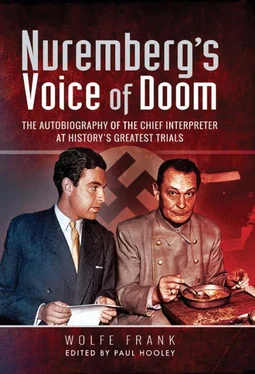The system of interviewing boards consisting of deaf, stammering or cross-eyed fogeys was, wisely, scrapped. To accept a Cockney, [1] A Cockney was at one-time defined as a person born within the sound of the bells of St Mary-le-Bow church in Cheapside, City of London.
for instance, who had perhaps received only an elementary level of schooling, was more than could be reasonably expected from an ‘old school tie’ staff officer.
It became the responsibility of officers commanding training units to select potential officers from amongst their men. These candidates then went before the WOSB, not as good or bad soldiers or even NCOs, but as a number. All badges of rank were removed, and names and past history were unknown to the testing officers. Candidates then went through three days of gruelling tests compiled by experts, including psychologists. At the end of the three days there was enough information to decide if the candidate was officer material and possessed the essential qualities of leadership, intelligence, adaptability, integrity, and courage.
The Board was housed in a beautiful country house near Godalming in Surrey where the accommodation and food were excellent. We were taken over by an NCO as soon as we arrived and, before being assigned quarters, we each of us received an armlet with a number that was pinned on the sleeve and covered all traces of any badges of rank.
Having selected our bunks, we were then conducted to a classroom for the written tests. For fully five hours, and without a minute’s break, we answered intelligence-test questions that became progressively more and more intricate and time limits had to be strictly observed. At dinner that night we were joined, in the pleasant officer’s mess, by three military testing officers (MTOs) who stayed with us every minute during the board. They not only knew at the end therefore what our qualifications and abilities were, but also if we had a semblance of decent table manners and what sort of conversationalists we were.
The second day was devoted to practical tests in the open and the third to tackling obstacle courses. There was one last interview with the officer in charge, this time not as a number but under one’s own name and rank. He asked in which unit I would like to be commissioned if I had passed. I told him that I wanted to remain in the RAC. He told me that this would be impossible. The age limit, strictly observed for the Corps, was twenty-five and I was exactly thirty. There was therefore no hope of an RAC commission for me.
I argued fiercely, pointing out that I had had all my military training in that branch of the army and that I had a technical background. It was no good.
The colonel suggested that I should select Infantry Support – a newly formed unit where I would be able to use my background. I gave in.
The news that I had passed reached the regiment two weeks later. I would be sent to a pre-OCTU where I would undergo infantry training until I had reached the standard of an Infantry NCO. From there I would go to the support OCTU at Alton Towers in Staffordshire. Following this I spent further periods of strenuous training at Wrotham in Kent and then at Sandhurst – the home of the Royal Military College and Armoured Corps OCTU – and we thought we were going to share in its comfort. We were quite wrong and ended up in tents half a mile away from the college.
I was finally commissioned on 22 December 1944 and at last stood on parade as a Second Lieutenant in a fighting regiment –The Royal Northumberland Fusiliers. The Passing Out (Army lingo for graduation) was taken by a rather ancient and, apparently, totally senile general who, when he came to me, stopped and looked me over. After ascertaining my name, he arrived at the standard questions used on all such occasions:
‘What were you doing in civilian life?’
‘I was a managing director of a sand pit, Sir.’
‘I see. Where?’
‘In London, Sir.’ (keep it simple I thought.)
‘I see,’ he said and passed to the next man. Then he stopped, pondered, and came back to me.
‘I say, there isn’t any sand in London, is there?’
There we were. One should always be accurate in one’s answers. Now I had to say, ‘No, Sir, there isn’t. Our pit was located in Kent and the offices were in London. Sir.’
‘Yes. Ah. Quite. Thank you,’ said the general and went on his way.
Then it was all over. There was a dance, when officers and NCO instructors became utterly human and when we equipped them, cold-bloodedly, for a major hangover – we weren’t there to see it – we were well on our way home for ten day’s leave.
This leave happily coincided with Christmas and New Year. I spent both with Phyllis Stanley-Rignold. The Woozle had been sent abroad, leaving her pregnant in a flat just across from the House on the Creek in Maidenhead and she had invited me to spend my leave there provided she wasn’t giving birth just then. I turned up, suitably equipped with some booze and Phyllis introduced me to a female friend staying with her whose looks, mind and performance were so totally insignificant that I would not have remembered her had she not tried to blackmail me, years later, as being responsible for a pregnancy – for the termination of which she thought I ought to come up with £300 pounds, please. I was happily married when the letter came, and my wife made me take it to a solicitor whose letter to the bitch ended the affair.
The war was still on when my leave was over, and I was still in it. There was a training period during which I had to show I was able to live up to the great tasks and responsibilities of being a Second Lieutenant who, it is said, ‘knows nothing and does everything whilst a major knows everything and does nothing.’
For some weeks I drilled troops, took them on route marches and gave them lectures. The time of my departure for the war was getting near. Then I was called to the adjutant’s office. This, I thought, was it. However, I found him staring at a form that I had filled in about four years earlier, just after joining the Army. It contained every scrap of personal data from the colour of my grandmother’s hair to the size of my socks.
‘I see, Frank, that you speak French,’ said the adjutant.
Thoughts began to race through my head. Liaison officer with some French outfit, perhaps? Some very special assignment? I felt worried. I had put ‘fluent’ in all three columns regarding my knowledge of French – ‘Read, write, speak’ In actual fact, my French had been quite good, though entirely non-military, but it was now almost non-existent. Perhaps there would be time to put this right.
The adjutant interrupted my thoughts.
‘I’m jolly glad I found out about you. I have a special job for you.’ (Airborne? Liaison? Interpreter?)
‘The Belgian Army is forming machine gun battalions. They will be using our Vickers machine-gun.’ (Liaison after all, damn that machinegun, don’t know an awful lot about it, really.)
‘Some officers and men are arriving here tomorrow. You, Frank, will teach them the Vickers.’ (Crash! This is the worst thing that could possibly have happened.)
‘Yes, Sir,’ I said, and staggered out.
The Belgians turned up the next day. They were headed by a colonel and there were seven sergeants. I headed for the Mess to face the music, but Colonel Viatour, a professional soldier, saved the day. I bought him a couple of whiskies, worked up the necessary courage and told him the truth.
‘I am,’ I told him, ‘supposed to teach you the Vickers machine-gun, however I lack two important qualifications for the assignment. Firstly, I couldn’t really teach the gun in any language, not even English. Secondly, I do not know the name of a single one of it’s several thousand components in French. Where do we go from here?’
Читать дальше












